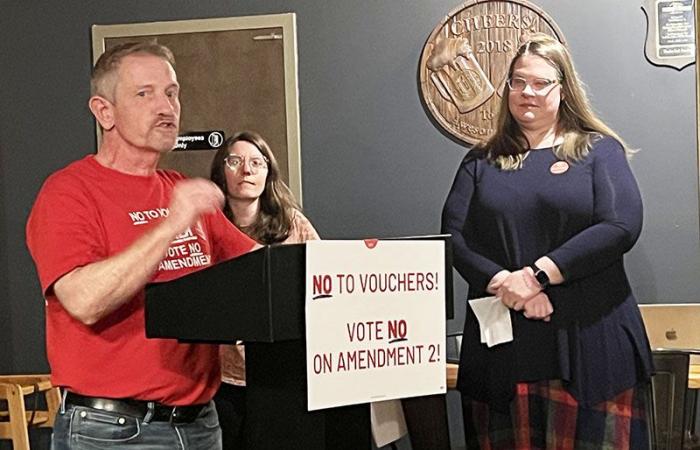Members of the Kentucky Education Association, Kentuckians for the Commonwealth and other education advocates opposing Amendment 2 held a final rally Sunday night. A crowd of about 60 people gathered at Wooden Cask Brewing in Newport to hear speakers and make final get-out-the-vote plans for the time leading up to the vote on Tuesday.
Amendment 2 would change limitations and mandates in the Kentucky constitution that prohibit the General Assembly from moving money from public schools to fund private schools. If passed, the amendment would add language that could circumvent the funding boundaries.
Opponents said this would clear the way for vouchers to fund private schools, funneling public funds away from public schools.
Not a partisan issue
“We are here in our home stretch to make sure that we’re educating our communities all across the Commonwealth about this dangerous constitutional amendment. It’s going to take money from our public schools and send it to unaccountable private institutions,” said Eddie Campbell, president of the Kentucky Educators Association.
Campbell went on to say that, in his opinion, this amendment would “sign the tax dollars away from our public schools and starve our students with critical resources that they need to receive a strong education and help them to be successful as they move forward in life.”
Campbell introduced Kentucky Teacher of the Year Kevin Dailey, who has been traveling across the state speaking out against the amendment.
“Amendment two is another attempt in a long train of abuses by private interest groups to destroy the public education system and to line their pockets with public money, all at the expense of our children,” Dailey said.
He added that the amendment is an example of efforts by private entities and interest groups to privatize public services.
“This is precisely what has happened to public education over the past several decades,” said Dailey. “To make these changes, these bad actors have resorted to removing centuries-old traditions and legal precedents established in our constitution that explicitly state public tax dollars be appropriated to the common schools and to no other purpose.”
He noted that the issue is not a partisan issue.
“Amendment 2 is neither liberal nor conservative. My student’s right to an education does not change if they are Democrats or Republicans,” said Dailey.
‘See what that choice actually looks like’
Kelly Lusk is a teacher who works for a nonprofit devoted to serving children and adults who are visually impaired and blind.
“We all hear that parents will have more choice if this amendment passes, but I wanted to see what that choice actually looks like,” said Lusk.
She said that there are 400 private schools in the commonwealth, 99 of them in Jefferson County and 114 in just four other counties — Kenton, Fayette, Campbell and Boone, leaving 186 schools spread across 115 counties.
In counties that have none or only one private school, if the amendment passes, these counties may open more private schools with costs for hiring personnel and construction of buildings and facilities.
“The money from the vouchers isn’t going to go very far,” said Lusk. “Guess how they will close the financial gap of having to build more buildings and facilities and hire personnel? — that’s right, raise tuition. They would no longer actually give families a discount. This amendment won’t really lead to school choice.”
High School English teacher Dylan Reed added, “Students come to us from various backgrounds and have various needs. We meet those needs individually and daily. Will a voucher school teach an English language learner? We do. Will they accept and teach a student with an IEP or 504? We do…Public education provides opportunities for all students, not just a select few, we teach everyone.”
Zach Neal, president of the Campbell County Education Association, praised public schools and said the services they provide go beyond classroom teaching.
“Teaching in various public schools acrossNorthern Kentucky has shown me that they are what brings a community together,” said Neal. “They are the heartbeat of our towns, and the reason that many of our students succeed. We provide resources, education, meals and services that no other entity provides.”






